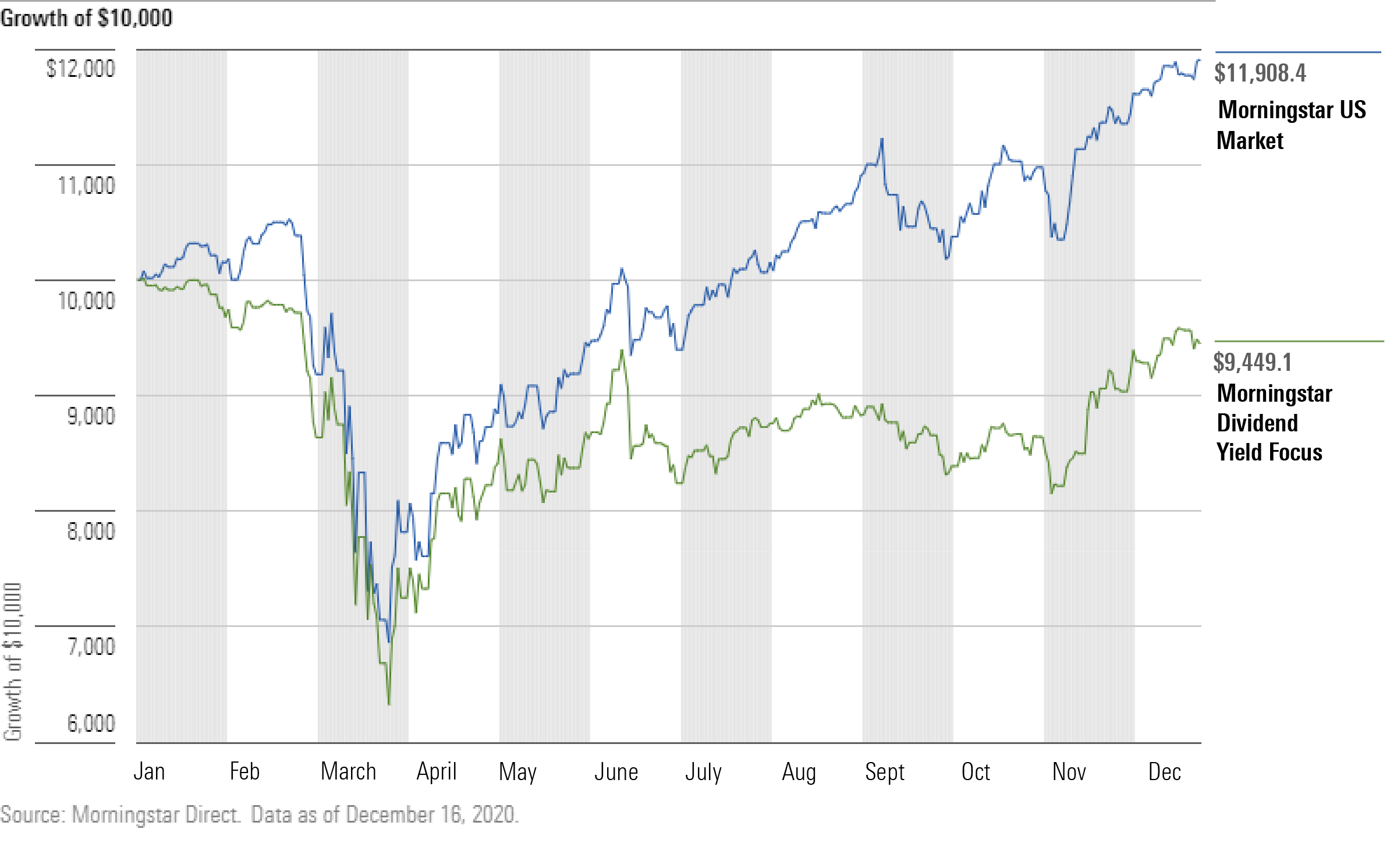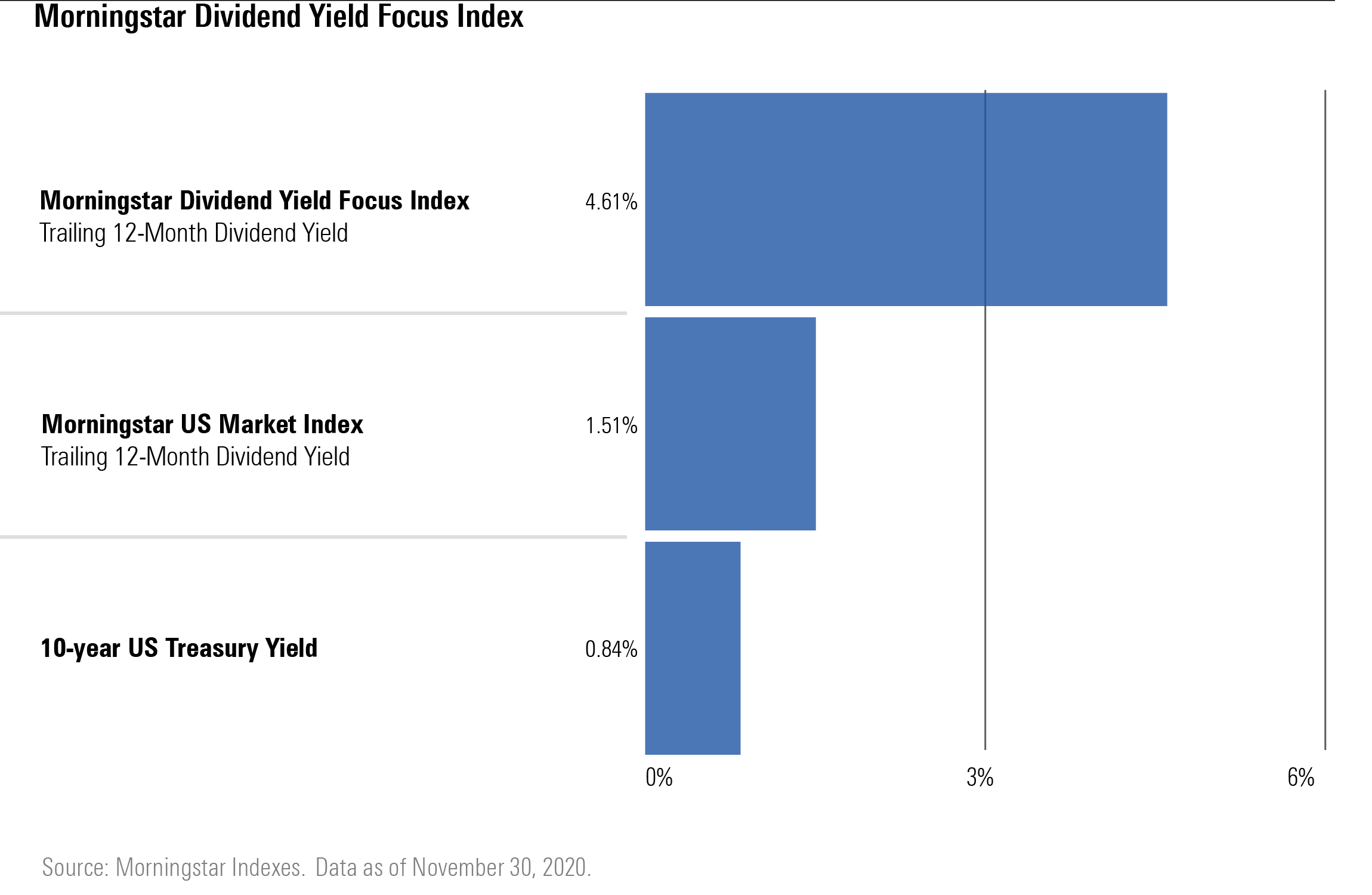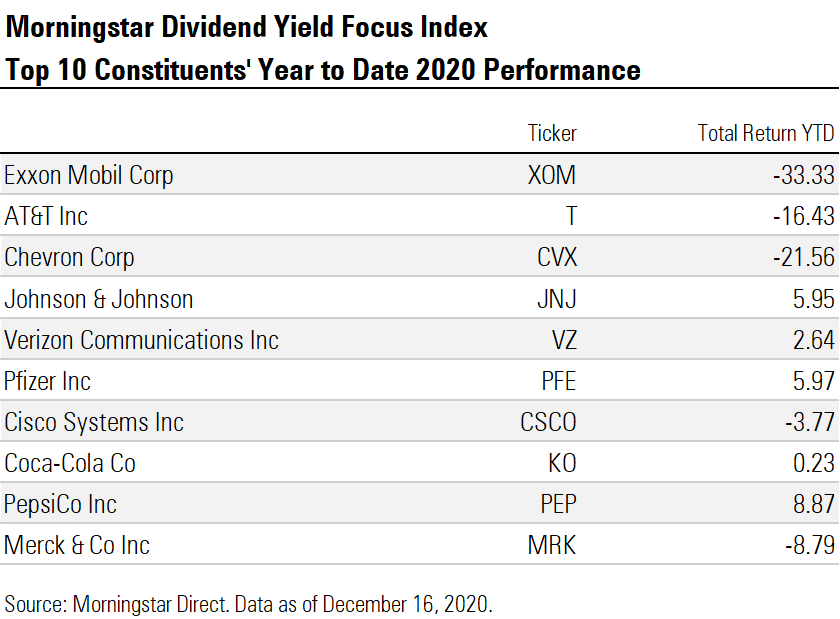The Value Rebound Is Good News for Dividend Investors
Equity income is well-positioned, both short- and long-term.
Dividend investors, like so many others, have experienced 2020 as an annus horribilis. The pandemic-driven economic downturn prompted a raft of companies to cut or suspend planned payouts to shareholders. In February, when equities entered a bear market, dividend payers fell harder and further than most. The Morningstar Dividend Yield Focus Index plunged by more than 25% in the first quarter, while the broad Morningstar U.S. Market Index dropped 20%. When stocks bounced back, dividend payers lagged.
But since November, dividend payers have mounted a comeback. The Morningstar Dividend Yield Focus Index has outpaced the market since early November.
Exhibit 1

The Dividend Yield Focus Index has also yielded more than 4% over the past year, compared with less than 2% for the U.S. equity market and less than 1% for the 10-year U.S. Treasury.
Exhibit 2

Dividend-paying stocks still have lots of catching up to do. But the market rotation to value stocks is good news for equity income investors. Meanwhile, the long-term case for dividend-paying stocks remains solid.
Dividends Caught in a Value Meltdown Dividend-paying stocks tend to cluster toward the value side of the equity market. Companies in slower-growing sectors like consumer defensive, utilities, energy, and financial services, are likelier to pay out cash to shareholders than in faster growing areas such as technology. The Morningstar Dividend Yield Focus Index lands in the large-value segment of the Morningstar Style Box, where most equity income strategies sit.
A value bias was a huge problem for dividend payers for the first 10 months of the year. The pandemic-driven downturn hit many value-leaning sectors hard. Consumer-oriented companies plummeted. Energy stocks suffered from falling demand and a price war among oil producers. Financials fell due to low interest rates and loan losses. Even utilities stocks, which had been market darlings in previous years for their rich yields, retreated on an anticipation of lower electricity use by industrial and commercial customers. Unsurprisingly, dividend cutters clustered in oil and gas, consumer-related areas, and anything related to travel.
Meanwhile, technology companies benefited from work-from-home, learn-from-home, shop-from-home trends. The market value of Zoom Video Communications ZM surpassed that of Colgate CL. By mid-2020, the gulf between growth stocks and value stocks came to resemble the heights of the dot-com bubble of 1999.
The Morningstar Dividend Yield Focus Index suffered for most of 2020 both for what it held and what it didn’t. Constituents like AT&T T, Wells Fargo WFC, Chevron CVX, and Coca-Cola KO struggled mightily. Meanwhile, not holding Apple AAPL, Microsoft MSFT, Amazon.com AMZN, and Alphabet GOOG held it back relative to the market.
Then came November. Promising vaccine results raised hopes for an end to the coronavirus pandemic. The market saw the U.S. election outcome as benign. Expectations of economic recovery lifted many beaten-down sectors. Dividend stocks soared as the value side of the stock market recovered. The dividend index was lifted by soaring energy and telecom stocks, as well as Big Pharma names like Pfizer PFE and Merck MRK.
Exhibit 3

What About Dividends Going Forward? Whether the dividend renaissance continues, only time will tell. From a valuation perspective, the market seems to be offering more upside within dividend-paying value sectors than on the growth side of the market. As of mid-December, Morningstar Equity Research saw the most attractively valued sector as energy and the most overvalued as technology. An economic recovery would be good news for economically sensitive areas, where many dividend payers ply their trade. Low interest rates are likely to continue to push many income investors into stocks.
Meanwhile, the long-term case for dividend payers remains strong. Not only does a significant portion of the long-term total return from equities come from reinvested dividends and dividend growth, but dividend payers have posted a strong track record relative to non-payers and the overall market. Dividend payers tend to be solid, cash-generative businesses. Committing to a regular payout instills discipline.
But dividend payers should be approached selectively. The market’s highest yielders are often troubled companies that turn out to be dividend traps. Investors who blindly chase yield can end up sacrificing returns. Dividends aren’t guaranteed and their sustainability must be always be gauged. The Morningstar Dividend Yield Focus Index, for example, focuses on high-yielders but screens them for quality and financial health.
Morningstar, Inc. licenses indexes to financial institutions as the tracking indexes for investable products, such as exchange-traded funds, sponsored by the financial institution. The license fee for such use is paid by the sponsoring financial institution based mainly on the total assets of the investable product. A list of investable products that track or have tracked a Morningstar index is available on the resources tab at indexes.morningstar.com. Morningstar, Inc. does not market, sell, or make any representations regarding the advisability of investing in any investable product that tracks a Morningstar index.

/s3.amazonaws.com/arc-authors/morningstar/033528a9-55cc-40aa-90a9-8d2d98697cf5.jpg)
/cloudfront-us-east-1.images.arcpublishing.com/morningstar/F2S5UYTO5JG4FOO3S7LPAAIGO4.jpg)
/cloudfront-us-east-1.images.arcpublishing.com/morningstar/7TFN7NDQ5ZHI3PCISRCSC75K5U.png)
/cloudfront-us-east-1.images.arcpublishing.com/morningstar/QFQHXAHS7NCLFPIIBXZZZWXMXA.jpg)
:quality(80)/s3.amazonaws.com/arc-authors/morningstar/033528a9-55cc-40aa-90a9-8d2d98697cf5.jpg)